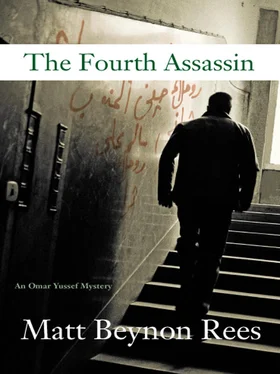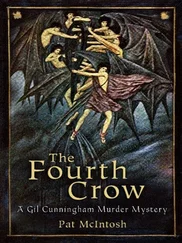Matt Rees - The Fourth Assassin
Здесь есть возможность читать онлайн «Matt Rees - The Fourth Assassin» весь текст электронной книги совершенно бесплатно (целиком полную версию без сокращений). В некоторых случаях можно слушать аудио, скачать через торрент в формате fb2 и присутствует краткое содержание. Жанр: Криминальный детектив, на английском языке. Описание произведения, (предисловие) а так же отзывы посетителей доступны на портале библиотеки ЛибКат.
- Название:The Fourth Assassin
- Автор:
- Жанр:
- Год:неизвестен
- ISBN:нет данных
- Рейтинг книги:3 / 5. Голосов: 1
-
Избранное:Добавить в избранное
- Отзывы:
-
Ваша оценка:
- 60
- 1
- 2
- 3
- 4
- 5
The Fourth Assassin: краткое содержание, описание и аннотация
Предлагаем к чтению аннотацию, описание, краткое содержание или предисловие (зависит от того, что написал сам автор книги «The Fourth Assassin»). Если вы не нашли необходимую информацию о книге — напишите в комментариях, мы постараемся отыскать её.
The Fourth Assassin — читать онлайн бесплатно полную книгу (весь текст) целиком
Ниже представлен текст книги, разбитый по страницам. Система сохранения места последней прочитанной страницы, позволяет с удобством читать онлайн бесплатно книгу «The Fourth Assassin», без необходимости каждый раз заново искать на чём Вы остановились. Поставьте закладку, и сможете в любой момент перейти на страницу, на которой закончили чтение.
Интервал:
Закладка:
I’ve never wanted so much to be mistaken , Omar Yussef thought, biting the knuckle of his forefinger.
Khamis Zeydan took up a vantage point beside Colonel Khatib and leaned forward, whispering to the president. Omar Yussef’s throat was dry; but when he fingered the UN identity card in his pocket, it became slippery with sweat. He extended his neck to check that Ismail was still in his seat.
The door of the public gallery came open with a sudden burst of shouting. Shoving past a white-shirted guard, four young Americans ran down the short aisle. One of them, wearing a blue sweatshirt with the Israeli flag across the chest, unfurled a banner: President of the Murderers , it read. The others called out insults and charged at the Palestinian delegation. The president dropped low in his chair, the shoulder pads of his suit nuzzling his ears.
“Terrorist Jew-killer,” one of the protesters shouted. “Worse than Hitler.”
Khamis Zeydan and Colonel Khatib came to their feet, grappling with the protesters. Khatib took a slim girl in her early twenties and slammed her to the floor. Her heckling became a wail of shock and pain. Khamis Zeydan slapped the youth who held one end of the banner and shoved him so that he tumbled over the girl. The president’s bodyguard wrestled with the other two demonstrators as a pair of UN security guards hurried down the steps to help.
Omar Yussef looked away from the melee toward the Lebanese delegation. Just then, Ismail rose and, with a smile, whispered to his boss. He went down the aisle and headed for an exit near the front of the hall.
Behind the turquoise marble of his desk on the podium, the chairman glanced nervously toward the fracas as he gabbled through the day’s agenda. The president would be the second speaker, after the Jordanian foreign minister’s introductory remarks. Omar Yussef stared at the exit Ismail had used. Above it, tired green lights flickered in the translators’ galleries. He turned toward Khamis Zeydan, but the police chief was on the floor, pinning one of the protesters.
Omar Yussef checked his watch. The president was scheduled to speak in less than ten minutes. He hurried out of the hall. To his left, a security guard barred the entrance to the delegates’ area. Omar Yussef wiped the sweat from his UN I.D., flashed it at the guard, and entered a long corridor, which sloped down along the side of the General Assembly. At the far end of the passage, he saw Ismail dodge around a corner.
The corridor was silent as Omar Yussef limped over the thin carpet. The pain in his ankle lanced through his shin. What would he tell Ismail when he caught up with him? That the president’s speech would be nothing but empty rhetoric? That it would be foolish to sacrifice oneself only to prevent this man making promises he could never keep? Omar Yussef had tried the previous day to dissuade Ismail. He could think of no new arguments with which to reason against a boy determined to kill for his god-and he was certain that Ismail had risen from his desk to commit murder.
At the bottom of the corridor, it split into a staircase and a gallery that curved behind the stage of the General Assembly Hall. Omar Yussef assumed that, if Ismail wanted to shoot the president, he would position himself as close to the stage as possible. Omar Yussef went into the gallery. His loafers tapped on the bare, whitewashed floor, echoing in the empty quiet. On the other side of the wall, the world was gathered, but Omar Yussef felt profoundly alone.
As the gallery rounded the back of the hall, Omar Yussef realized that it had no outlet onto the stage. He came to a few small windows with a view of the plaza behind the UN building. The bare trees cowered in the wind, and rain splattered from a massive tubular steel sculpture like blood spitting from a body under the volley of a machine gun.
Omar Yussef doubled back. Applause rattled through the wall from the Assembly, and he knew the president was making his way to the stage. He clicked his tongue: the detour through the gallery had wasted time. With a hissing intake of breath and a grimace at the agony in his ankle, he mounted the stairs.
Two flights up, he was sweating with pain and exertion. Beside a heavy door marked TRANSLATION, a red light flashed in a black pad mounted on the wall. Omar Yussef swiped his UN I.D. across the pad and jerked the door handle. It didn’t move. He was flushed with adrenaline. He felt sure that Ismail must be behind this door.
He had to find another way in. He was about to continue to the floor above, when the entrance opened and a middle-aged Asian woman emerged. She smiled at Omar Yussef and held the door for him. Premature aging has its advantages, he thought.
He entered another curving gallery, but this time there were doors along the left-hand side. He opened the first one and saw a low-lit booth with two seats. Its window fronted onto the General Assembly Hall. Before each seat, a microphone on a long black neck reached out of a desk. An olive-skinned woman, enunciating clear, loud French, turned quickly to Omar Yussef, then looked away. Below the window, the president was at the podium, organizing his papers. Omar Yussef spoke no French, but he heard the woman use the words “Mesdames et Messieurs.” The speech is starting, he thought.
He went along the corridor, pushing open the doors. Beyond them, translators with Arab features transformed the president’s words into Russian, Spanish, Chinese.
The last door stuck when Omar Yussef turned the handle. He shoved with his shoulder, groaning as he pushed hard off his injured ankle. He took a breath. Inside the room, he heard a familiar voice. With another effort, he forced the door back a few inches and edged around it.
He stepped on something soft that resisted his weight. Looking down, he saw a young Arab man in a white shirt and blue necktie, his wrists tied to his ankles behind his back. He shifted his stance, and the man rolled beneath him. Omar Yussef came down on his elbows as the door slammed behind him.
Ismail sat in the translator’s seat. He held a pistol in his left hand, training it on Omar Yussef.
“Keep still, ustaz ,” he muttered, his hand cupped over the head of the long black microphone.
“Ismail, don’t be foolish.”
The man on the floor beside Omar Yussef nudged him with a twitch of his neck and whimpered in a frantic falsetto. “By Allah, don’t say a word. Can’t you see he’s got a gun?”
Ismail read into the microphone from an English text on the desk before him. “We, the Palestinian leadership, have shamefully abused our people. We have allowed corruption to reign in Occupied Palestine. We have murdered our heroic Islamic fighters, even as they struggled toward martyrdom against the Zionist Occupation Forces.”
The boy glanced at Omar Yussef and smiled as he read on. From the discarded headphones on the desk, Omar Yussef heard the familiar uninspiring drone of the president’s voice.
Ismail’s doing his own mistranslation of the president’s speech, Omar Yussef thought. This fellow tied up on the floor must be the real English translator.
“Worst of all, we have involved ourselves in a scandalous sham called the ‘peace process,’” Ismail continued, “which surrenders the Islamic land of Palestine and our people’s birthright to the Zionist Occupation, in return for the vague promise of a slave state.”
Omar Yussef gripped the corner of the desk and pulled himself up slowly. He looked down at the Assembly Hall. The president seemed small at the podium. Khamis Zeydan was at the side of the stage, scanning the room. Most of the delegates lounged in their seats, but there was more motion on the floor than Omar Yussef would have expected. Those are the ones listening in English, he thought. This speech isn’t what they bargained for.
Читать дальшеИнтервал:
Закладка:
Похожие книги на «The Fourth Assassin»
Представляем Вашему вниманию похожие книги на «The Fourth Assassin» списком для выбора. Мы отобрали схожую по названию и смыслу литературу в надежде предоставить читателям больше вариантов отыскать новые, интересные, ещё непрочитанные произведения.
Обсуждение, отзывы о книге «The Fourth Assassin» и просто собственные мнения читателей. Оставьте ваши комментарии, напишите, что Вы думаете о произведении, его смысле или главных героях. Укажите что конкретно понравилось, а что нет, и почему Вы так считаете.












